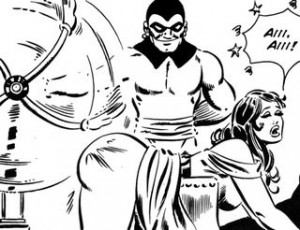I’m about to go to a friend’s place, climb up a tree, and start cutting it down while I’m on it, with a chainsaw. The tree’s threatening to fall over and destroy the neighbour’s roof, so it needs to be taken down in small sections. It’s a very high tree, and this actually involves a certain amount of fear on my part. So I’m going to be extremely careful. Still, if there’s never another post on this blog, you’ll know roughly what happened.
Anyway, I occasionally read attacks on bdsm as something that’s inherently sexist, patriarchal, anti-women and so on. Most people who take part in bdsm know that this attack involves a total misinterpretation of what happens in bdsm.
Points we often make in reply are:

1. what about gay and lesbian bdsm, where either there are only women involved, or there are no women involved? So how can men be oppressing women if there are no men there? Or there are men but no women there?
2. what about men submitting and women dommes? (And if you say that that’s oppressing women because the dom serves the submissive, then why won’t you say that about male doms?)
3. what about choice? If a woman chooses to submit, then that’s an expression and an assertion of her desires and her sexual self? When did women making choices, and acting on them, become a bad thing, from a feminist point of view?
But there’s another issue, I think. Shortly after the Law Lords, in Britain, rejected the appeal of the Spanner group (a group of gay men who were arrested, tried, convicted, and slung into jail for engaging in consenting bdsm sex), they reaffirmed the right of parents and teachers to use corporal punishment on children.

By the way, the Law Lords, also called the Lords of Appeal in Ordinary, which is a cool name, are a group in the British House of Lords who happen to have legal qualifications and judicial experience. Since they’re selected from among a relatively small pool, they’re probably less learned and competent than a panel of judges hearing an embezzlement case in Manchester, for example. But that’s what you get for taking hereditary privilege seriously.
Anyway, the height of the British establishment ruled that it’s not okay to cane someone, for example, if that person is an adult, is consenting and is going to enjoy it sexually. But it’s very much okay to cane a terrified child, since the child is not consenting and will be seriously hurt.
I think the Law Lords knew something that anti-bdsm feminists have missed. That is, bdsm mocks power. We take the clothes, the instruments and some of the language, of people in power, and we turn them into something arbitrary. That is, the person with the power isn’t necessarily heterosexual. If it’s a heterosexual couple, the power isn’t necessarily with the man. In bdsm , power isn’t necessarily with the person with the most money, or the most prestigious job.

Power goes to where the partners choose it to go, according to what will be sexiest.
Power has to serve the interests of pleasure.
Authoritarians don’t like that. Bdsm makes play out of something that they take very very seriously, and that feels like mockery.
Okay. It’s chainsaw time.
Update!
All electrical and telephone wires still up. Neighbour’s house still standing. I’m still standing. The tree is down.













